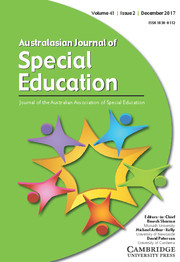Article contents
The delivery of educational technical assistance services for children with special learning needs: A comment on Maggs
Published online by Cambridge University Press: 26 February 2016
Abstract
Recently Maggs described a model for the delivery of technical assistance in special education settings in which he emphasized the importance to service delivery of the role played by consultant personnel. This paper identifies three fundamentally important influences on the work performance of consultants, whether they are working “traditionally” or within a model such as that proposed by Maggs.
- Type
- Viewpoints and Brief Reports
- Information
- Copyright
- Copyright © The Australian Association of Special Education 1980
References
- 1
- Cited by


